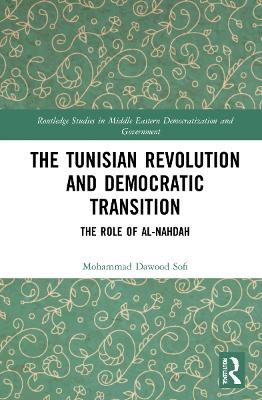
The Tunisian Revolution and Democratic Transition
Routledge (Verlag)
978-0-367-76231-5 (ISBN)
Drawing on the history of post-independence Tunisia, the book studies the evolution of al-Nahḍah as a political party in Tunisia and its role in a protracted struggle to shape the post-authoritarian order along democratic lines. It explores al-Nahḍah's relationship with the Tunisian state, society and beyond that resulted in shaping its fluctuating expressions of ideology and practices.
State repression, political participation, or internal differentiation (among other factors) place an Islamic movement (in this case al-Nahḍah) in such a situation that demands a perpetual self re-evaluation as well as implementation of ideology, objectives, and political programmes. The study explains how the socio-political setting in Tunisia demanded various ideologically opposite currents (Islamic, liberal, or leftist) to endure cross-ideological cooperation either to contest authoritarian regimes or to engage in the political process. It more importantly analyzes the trajectory of a gradual democratization process in the country and provides evidence explaining the impact and importance of a vibrant civil society, building alliances, and sharing of power.
The book provides comparative analytical attention to the primary sources on these issues to create a critical historiography. It thus adds to the body of literature on the state, society, and politics in the MENA region and particularly targets students, scholars, and social scientists interested in understanding the nature of power and politics in Tunisia and beyond.
Mohammad Dawood Sofi is an Assistant Professor (Contractual) in Islamic Studies at the Directorate of Distance Education (DDE), University of Kashmir Srinagar, India. Prior to joining DDE, he served as a postdoctoral research fellow in International Relations at Ankara Yildirim Beyazit University, Turkey. His recent books include Rāshid al-Ghannūshi̇̄: A Key Muslim Thinker of the 21st Century (2018).
Introduction Section I. Reading the History of Ḥizb al-Nahḍah 1. Ḥizb al-Nahḍah: Causes, Origins, and Early Development 2. From Al-Jamā‘ah al-Islāmi̇̄yyah to Ḥarkah al-Ittijah al-Islāmi̇̄ 3. Ḥizb al-Nahḍah: The Fall of Bourguiba and the Engagement with Bin Ali Section II. The Genesis of the Tunisian Revolution: A Discussion 4. Tunisian Revolution in the backdrop of Arab Spring 5. The Path to Tunisian Revolution Section III. Post-Revolution Political Milieu of Tunisia: Understanding the Role of al-Nahḍah 6. Post-Revolution Tunisia and the Path to Democratic Transition 7. Ḥizb al-Nahḍah: Power, Politics, and the Governance Test Conclusion
| Erscheinungsdatum | 04.11.2021 |
|---|---|
| Reihe/Serie | Routledge Studies in Middle Eastern Democratization and Government |
| Zusatzinfo | 2 Tables, black and white; 3 Line drawings, black and white; 3 Illustrations, black and white |
| Verlagsort | London |
| Sprache | englisch |
| Maße | 156 x 234 mm |
| Gewicht | 453 g |
| Themenwelt | Geisteswissenschaften ► Philosophie |
| Geisteswissenschaften ► Religion / Theologie | |
| Sozialwissenschaften ► Politik / Verwaltung ► Politische Systeme | |
| Sozialwissenschaften ► Soziologie ► Spezielle Soziologien | |
| ISBN-10 | 0-367-76231-5 / 0367762315 |
| ISBN-13 | 978-0-367-76231-5 / 9780367762315 |
| Zustand | Neuware |
| Haben Sie eine Frage zum Produkt? |
aus dem Bereich


